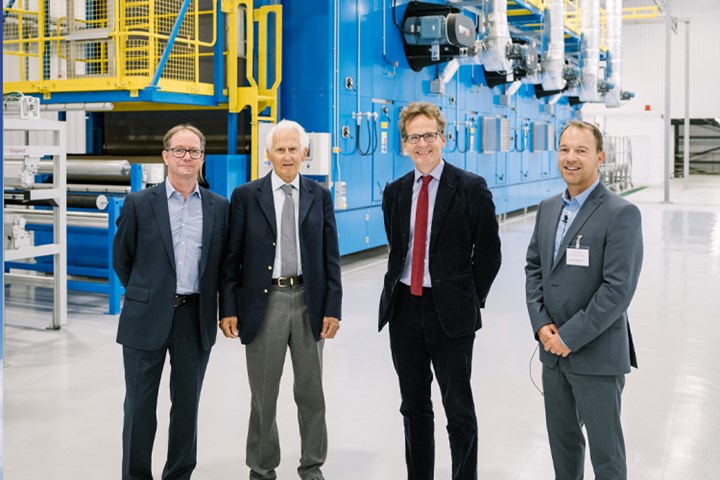Technical Fibre Products opens new nonwovens manufacturing line
New line increases nonwoven capacity and extends TFP’s warehousing to support the increase in product and raw materials.

Left to right: Martin Thompson (MD of TFP), Sir James Cropper (honorary president of James Cropper PLC), Mark Cropper (chairman of James Cropper PLC) and Phil Wild (CEO of James Cropper PLC). Photo Credit: Technical Fibre Products.
In response to increasing demand for Technical Fibre Products’ (TFP, Burneside, U.K.) advanced nonwovens across all markets, TFP announces the formal opening of its new manufacturing line, which significantly increases the company’s nonwoven capacity.
The new line was formally opened on July 28 by Mark Cropper, chairman of TFP’s parent company James Cropper PLC (Burnside), alongside Martin Thompson, managing director of TFP, Phil Wild, CEO of James Cropper PLC and Sir James Cropper, honorary president of James Cropper PLC. Commissioning of the new line is expected to start soon and represents a significant financial investment for the company, with new infrastructure installed to house the line and extended warehousing to support the increase in product and raw materials. The expansion also follows an already significant capacity increase in 2015.
“This production line delivers another significant capacity increase for TFP, which is necessary to meet rapidly increasing demand for our nonwovens in markets such as fuel cells and defense, as well as facilitating delivery of the company’s successful growth strategy,” notes Martin Thompson, TFP’s managing director. “The opening of the line is the latest step in TFP’s growth, which has also included the acquisition of TFP Hydrogen Products Ltd (formerly PV3 Technologies Ltd) in January this year to expand our product portfolio and knowledge base in hydrogen technologies.”
TFP says it is a successful knowledge-based manufacturing company specializing in developing advanced nonwovens and other related materials for highly technical and challenging applications. The company’s advanced nonwovens are said to provide innovative solutions across a number of growth industries such as hydrogen fuel cells, aerospace, defense and wind energy. These materials are used extensively in a multi-functional capacity in advanced composites, and reportedly play a crucial role in facilitating of wind turbines and electric vehicles (EV) lightweighting, as well as commercial and defense aircraft.













